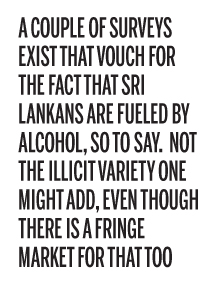
Sri Lanka has a per capita income almost twice that of India. This fact is forgotten when the country is forced to borrow these days from proximate friends such as India, and Bangladesh, and friends further away such as China.
But our per capita income comparison with India is ignored these days by many people, especially among the younger cohort that walk around feeling sorry for themselves saying we have to contend with being the borrower nation in Asia.
We may be a borrower nation at the current moment, but it’s difficult to estimate that our political culture didn’t contribute in the past five decades or so to the kind of per capita income we enjoy in this country. Our per capita income makes us a relatively rich country in the region, period, and that’s not all down to the ingenuity of the people.
Maligned as it is, our political culture — our politics and our politicians in other words — played a contributory role in ensuring this relative state of comfort compared to the rest of the nations in our midst.
It’s our general state of being well-off relatively that has made us into what we are sometimes — a nation full of whiners. Our complaints are loud, and we do complain a lot.
 To some extent it’s a symptom of what might be called relative ‘affluensa.’ By no means is this writer suggesting that we are a rich country. But, the bottom line is that yes, indeed we are relatively rich in comparison to regional nations big and small, and that’s nothing to scoff at.
To some extent it’s a symptom of what might be called relative ‘affluensa.’ By no means is this writer suggesting that we are a rich country. But, the bottom line is that yes, indeed we are relatively rich in comparison to regional nations big and small, and that’s nothing to scoff at.
Untouched
As a country we have had the experience of coming out of the most traumatising of periods relatively unscathed economically. A thirty-year battle against terrorism didn’t make us buckle under the pressure. Instead, the country almost seemed to make an advantage of a disadvantage to emerge as one of the top-performing economies of the region.
In a nation that has been used to such paradoxes, people complain at the drop of a hat because they know that by and large they are maintaining their lifestyles anyway, no matter what happens.
Of course the country’s relative affluence has come at a cost to certain sectors of the working classes. The vast labour force that regularly takes up employment in the gulf countries (Middle East) is not an attribute we can boast about as a nation.
But at least a massive welfare economy has been maintained with the monies that have come in from the Middle East, augmented by other earnings from an export economy that relies heavily on the garment sector and so on.
Not that corruption and so on has not been endemic to our emerging nation’s lifestyles. But, despite that the oldest democracy in Asia has managed to survive by and large with democratic institutions intact.
Some say it is due to a class of charmed elite that’s largely untouched by any of the upheavals that take place in the country in terms of class fissures that break out in violence, religious and ethnic strife and so on. But, there are almost no classless societies and in that respect at least Sri Lanka has not been the exception. At least these class-divides have not erupted as chasms that cannot be bridged.
Terminally
At the very worst, we have bumbled through even when society was breaking apart due to hostilities and various other pressures on our social fabric. There are many who would retort by saying that bumbling-through is no badge of honour, and no it is not. But the point is that we have had the economic wherewithal to bumble through and not have the social fabric collapse and everything fall apart around us.
That’s not due to some good luck talisman worn around our collective necks. Instead we have had some things that work, including a solid private sector institutional framework that at least has some semblance of a meritocracy in contrast to the apparatus of the State.
Some say that the charm has to wear off some time and the cracks in the edifice are bound to make the entire structure of State come apart in a heap. They say the time for that seems to be now when we are ‘facing the worst economic crisis since independence.’
But the debate that seems to define our times most is on whether we as a country should be looking towards substantial IMF assistance or not. That indecision does not look as if it’s a ‘condition’ that a terminally ill-nation would be suffering from.
Besides all that, our tastes have been upscale in a collective sense. Some may say that it’s a sign that there is a class of rich people who are used to the good life, but that’s not entirely the issue. Is it a class of exclusive rich that seem to have a common drinking habit for instance — bad as the example is?
A couple of surveys exist that vouch for the fact that Sri Lankans are fueled by alcohol, so to say. Not the illicit variety one might add, even though there is a fringe market for that too.
The reasonably moneyed can afford these habits. In any event, these statistics reflect the rest of the reality that’s all too well known. We have enjoyed quality of life indexes way above comparable nations in the region.
This is old hat. Is a country of this sort poised to implode as some commentators are prone to say we are? It’s not likely, and there are no comparable examples of countries which were this relatively well-off failing off the map, as it were, just like that.
To some extent the spoilt child syndrome animates this society. We know the drill. When families grow to be rich, a lot of the children turn out to be ne’er do wells of well to do parents.
Flounder
It’s almost a concomitant of growing up comfortable. That does not mean that all those families that boast of considerable wealth — old money they say — come to grief. There are some that simply go to seed, it’s true. But not all.
But the same analogy cannot be made for a country that has a record of solid professionalism, entrepreneurship and so on. We have contributed almost disproportionately to the output in the so called STEM fields the world over, and our researchers and scientists are all over the place.
Some may say that’s the surest sign that this country isn’t thriving because all these people have left our shores and sought greener pastures.
It’s not a fair assessment because for every individual that left, there are five reasonably good brains that have stayed back and made good.
The other factor is that we are a rather self-effacing nation, in a collective sense. We are hyper-critical of ourselves which is why there is so much negativity when there is the slightest sign of a slump. This may have the effect of ‘drag’ on the ship of state and we may appear to flounder because there are so many people over here that are pessimistic.
But, there is a good side to that too. All this self-criticism means that we are not generally self-congratulatory or absurdly patriotic.
But the constant carping is undergirded by a reasonable work ethic. Those who are born lazy are at least fiercely competitive — with one another.
All this self-criticism is certainly not necessarily a sign that we are going under. It’s an indication that we as a people are interested in self-preservation. When we attack each other, we also keep each other on our toes.
That may not be the intent, and sometimes the intensity of the attacks — the ‘internecine battles’ — may be disconcerting. But that is the paradox.
If we are not interested in cohesiveness and collective progress as a nation, we would not have been at each other with such passion. But we are. That’s hardly a sign of a people having given up — it’s on the contrary a sign of vibrancy, and a pugnacious spirit that doggedly prevails.
